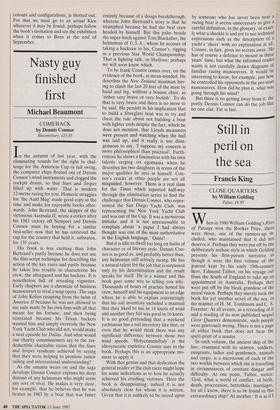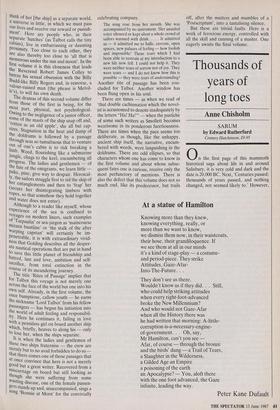Still in peril on the sea
Francis King
CLOSE QUARTERS by William Golding
Faber, £9.95
When in 1980 William Golding's Rites of Passage won the Booker Prize, there were those, one of the runners-up in- cluded, who maintained that it did not deserve it. Perhaps they were put off by the deliberately archaic style in which Gelding presents his first-person narrative as though it were the first volume of the • urnal kept by his early 19th-century
ro, Edmund Talbot, on his voyage out
m the South of England to take up an appointment in Australia. Perhaps they were put off by the bleak grandeur of the moral vision. Perhaps they merely took the book for yet another novel of the sea, in the manner of H. M. Tomlinson and C. S. Forester. At all events, as a rereading of it and a reading of its now published sequel Close Quarters demonstrate, such people were grievously wrong. There is not a page of either book that does not bear the spirit-print of a master.
In each volume, the ancient ship of the line, crammed with its seamen, soldiers, emigrants, ladies and gentlemen, animals and cargo, is a microcosm of each of the two worlds between which she is travelling in circumstances of constant danger and difficulty. At one point, Talbot, writes: `God, what a world of conflict, of birth, death, procreation, betrothals, marriages, for all I know, there is to be found in this extraordinary ship!' At another: 'It is as if I
think of her [the ship] as a separate world, a universe in little, in which we must pass our lives and receive our reward or punish- ment'. Here are people who, in their separate 'hutches' (as Talbot calls the tiny cabins), live in embarrassing or daunting proximity. Too close to each other, they are also thereby too close to 'all that is monstrous under the sun and moon'. In the first volume it is this closeness that leads the Reverend Robert James Colley to betray his sexual obsession with the Billy Budd-like Billy Rogers and, in remorse, a valour-ruined man (the phrase is Melvil- le's), to will his own death. The dramas of this second volume differ from those of the first in being, for the most part, physical, not psychological. Owing to the negligence of a junior officer, some of the masts of the ship snap off and, rotten as an old apple', she all but cap- sizes. Stagnation in the heat and damp of the doldrums is followed by a passage through seas so tumultuous that to venture out of one's cabin is to risk breaking a limb. Weed, flourishing like a submarine Jungle, clings to the keel, encumbering all progress. The ladies and gentlemen — of the fate of the emigrants, we learn little puke, pine, give way to despair. Heroical- ly, the sailors struggle first to rid the ship of her entanglements and then to `frap' her (secure her disintegrating timbers with ropes, so that somehow they hold together and water does not enter). Although to a reader like myself, whose experience of the sea is confined to voyages on modern liners, such examples of Tarpaulin' or sea-jargon as `maincourse mizzen buntline' or 'the stalk of the after Warping capstan' will certainly be im- penetrable, it is with extraordinary vivid- ness that Golding describes all the desper- ate nautical operations that are put in hand to save this little planet of friendship and hatred, lust and love, ambition and self- sacrifice, from total extinction in the course of its meandering journey. The title 'Rites of Passage' implies that for Talbot this voyage is not merely one across the face of the world but one into his own self. Already, in the first volume, the once bumptious, callow youth — he earns the nickname 'Lord Talbot' from his fellow passengers — has begun his initiation into the world of adult feeling and responsibil- ity. Here he continues it, falling in love with a penniless girl on board another ship which, briefly, heaves to along his — only to lose her, when the ships separate. It is when the ladies and gentlemen of these two ships fraternise — the crew are sternly but to no avail forbidden to do so - that there comes one of those passages that at once convince that here is not a merely good but a great writer. Recovered from a miscarriage on board but still looking as though she were suffering from some wasting disease, one of the female passen- gers stands up and, unaccompanied, sings a song 'Bonnie at Morn' for the convivially celebrating company.
The song rose from her mouth. She was accompanied by no instrument. Her unaided voice silenced or kept silent a whole crowd of sailors warmed with drink. . . . It admitted us — it admitted me to halls, caverns, open spaces, new palaces of feeling — how foolish and impossible! Those tears which I had been able to restrain at my introduction to a new life now fell. I could not help it. They were neither tears of sorrow nor of joy. They were tears — and I do not know how this is possible — they were tears of understanding!
Another rite of passage has been con- cluded for Talbot. Another window has been flung open in his soul. • There are times — as when we read of `that double cachinnation which the novel- ist is accustomed to denote inadequately by the letters "Ha! Hal"' — when the pastiche of some such writers as Smollett becomes wearisome in its ponderous facetiousness. There are times when the pace seems too deliberate, as though, like the unhappy, ancient ship itself, the narrative, encum- bered with weeds, were languishing in the doldrums. There are odd ellipses, so that characters whom one has come to know in the first volume and about whose subse- quent fates one is curious, receive only the most perfunctory of mentions. There is also the defect that thiS" volume does not so much end, like its predecessor, but trails off, after the mutters and mumbles of a Postscriptum', into a tantalising silence.
But these are trivial faults. Here is a work of ferocious energy, controlled with all the skill and cunning of a master. One eagerly awaits the final volume.




























































 Previous page
Previous page